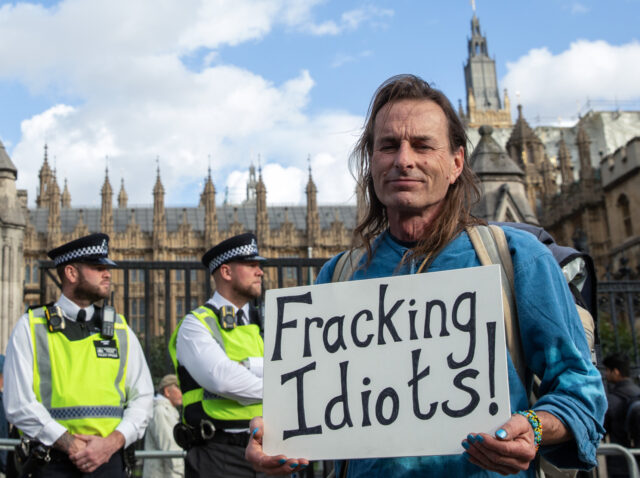Rough, a gigantic British gas storage facility in the North Sea which the government allowed to go to the wall in 2017, is being gradually brought back to life as the energy crisis bites.
North Sea gas storage site Rough had accounted for an astonishing 70 per cent of Britain’s relatively unimpressive gas storage capacity at the time of its closure — a strategic resilience issue in itself, given the ‘all eggs in one basket’ situation it left the country in — with operator Centrica estimating the loss of the “cushion” energy supply it provided ended up costing customers around £88 each, or £2.4 billion in total, last winter.
Even when Rough was fully operational, Britain could only count on around 15 days’ supply in the event of a crisis, with that feeble resilience reduced to an even poorer six days by the beginning of 2022. The decision was taken at a time when the global market was awash with cheap gas, and the government naively believed all energy needs could be met by short-term buying, with no need for long-term emergency storage.
Now that the facility, which takes the form of a huge depleted gas field embedded in solid rock miles underwater which can be pumped or emptied of gas at will, is being revived and back up to around 20 per cent capacity, the country has around nine days’ worth of storage. This is still the lowest in Europe, however, according to The Guardian.
As with many of the crises facing Britain, the government would have the public believe that Russia and Vladimir Putin should be blamed for the energy crunch, but Britain’s especially parlous situation — despite the fact it imports little Russian gas directly — can be attributed in large part to years of mismanagement by Conservative Party-led governments.
Some one-third of gas electricity generation was lost between 2010, when the Conservatives were returned to office, and 2020 — along with around two-thirds of oil electricity generation and a whopping 94 per cent of coal electricity generation, as the notionally right-wing party pursued a ruinous and strict green agenda.
Indeed, in order to meet emissions targets, the government has allowed domestic generation to shrivel and increased Britain’s reliance on interconnectors that bring in energy that is generated abroad, which therefore does not count towards the national carbon count. This, obviously, is an accounting trick that simply exports emissions to other countries willing to produce electricity then export it, and one which leaves the country dangerously vulnerable if there are issues with the interconnectors, generation issues in supplier countries, or general energy shortages which result in exports being restricted.
As it happens, all of these circumstances have come at once and the UK has been left with no ‘rainy day’ reserve, a failure of forward planning some find baffling.
British Blackouts More Likely as Repairs to French-UK Power Line Delayed https://t.co/LkQdBRn4gt
— Breitbart London (@BreitbartLondon) November 19, 2022
In an article examining how the government’s failure to ensure some resilience in the event of a crisis by preserving and promoting gas storage, The Telegraph, which is close to Britain’s governing Conservative Party, quoted former ministers as saying that “the facts” have changed since they made the decisions which have left the country facing a bleak winter at the mercy of foreign exporters.
The Conservatives, then in a coalition government with the Liberal Democrats, announced there would be no subsidies for gas storage in September 2013 — with Centrica canning plans for two large-scale facilities similar to Rough days later as a result.
Stag Energy had approached the government about another scheme to store huge quantities of gas in salt caverns under the Irish Sea months previously — but were brushed off after a perfunctory 30-minute meeting.
In the end, British gas storage not only failed to expand, it contracted, with the closure of Rough itself being announced in 2017 — and the government again not only declined to intervene but refused to conduct an inquiry into storage issues requested by providers and users and insisted “market forces would ensure there was enough gas,” according to Reuters.
Notably, Rough is even now being reopened not at the behest of the British government, but by Centrica off its own back.
Farage: Brexit Britain Should Be Energy Independent ‘Like America’ but Leaders Are ‘Addicted to Green Agenda’https://t.co/x8MKNDCngE
— Breitbart London (@BreitbartLondon) October 13, 2022
“We take gas security of supply seriously which is why we regularly and comprehensively test our assumptions and the latest evidence,” said a government spokeswoman at the time of Rough’s initial closure.
There have been no reports of any British government employee being fired or punished now this supposedly comprehensive testing of evidence has failed to leave Britain in a position where it is ready to meet the real-life energy crisis now ongoing. Perhaps that is unsurprising, given actual consequences for failure of that kind by government employees are exceedingly rare.
“The Government has to get actively involved in energy issues, because the consequences of getting it wrong for the country are simply too great,” commented Charles Hendry, a junior government minister for energy from 2010 to 2012 now no longer in Parliament, never mind government, who pushed unsuccessfully for more storage during his time in office.
Hendry told The Telegraph that it was “a disastrous failure to not recognise that gas storage was a sensible insurance policy, which would, in the long term, have been good for UK consumers”.
UK PM Sunak Funds Ukrainian Energy Independence After Banning Fracking at Home https://t.co/obqJzQRHOL
— Breitbart London (@BreitbartLondon) November 15, 2022

COMMENTS
Please let us know if you're having issues with commenting.